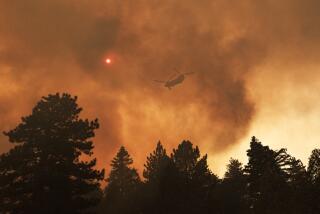‘Airpocalypse’: Severe pollution cripples northeastern China
BEIJING -- A large swath of northeastern China has been virtually paralyzed for two days by severe air pollution that forced airports and schools to close and drivers to turn on their headlights in the middle of the day.
The “airpocalypse” was blamed on the start of the winter heating season Sunday in a region that still uses coal-powered plants and the burning of fields at the end of the harvest. The lack of wind and high humidity also contributed to the severe pollution, meteorologists told the state media.
In Harbin, a city of 12 million world-famous for its wintertime ice festival, the smog was so thick that visibility was reduced to 20 yards. Municipal bus drivers lost their way in the haze. In one case, a morning rush hour bus that left at 5:30 wandered around for three hours before the driver found the route.
Expressways around the city were closed and the pedestrians who braved the outdoors mostly wore face masks.
Other cities that experienced unusually high pollution, which local media labeled as record-breaking, included Changchun, capital of Jilin province, and Shenyang, capital of Liaoning.
The emergency was a stark reminder of the high costs of China’s breakneck economic development. Beijing occasionally experiences days during which pollution veers into hazardous levels, but it is rare in the far north of the country.
Doctors warned that residents could experience respiratory symptoms in coming days.
“The impact of air pollution on people will be gradual. There won’t be a sudden outbreak of symptoms, but normally three to five days after the smoggy weather occurs, there is a peak in the number of people seeing doctors,” Deng Ying, a doctor at the Second Affiliated Hospital of Harbin Medical University told China’s New China News Agency.
Officials said that PM 2.5, the fine particulate matter that is most destructive to the lungs, was over 500 micrograms per cubic meter in most of the city Tuesday and in some downtown locations reached up to 1,000. A reading over 300 is considered hazardous by the World Health Organization.
Harbin’s daily newspaper said that 2,000 schools, mostly kindergartens, primary and middle schools, had been ordered closed on Monday and Tuesday. The city of Harbin’s website instructed residents to drive with their headlights on at reduced speed.
Pedestrians complained they had difficulty making their way because visibility was so low.
“I’m in Harbin holding your hand, but I can’t see your face,’’ wrote one microblogger on the popular Sina.com website.
More hazardous air days are expected in coming weeks as temperatures drop and the heating is turned on throughout northern China. Beijing on Tuesday announced emergency measures that would force schools to close and cars to be restricted to odd-even-day driving based on their license plates if pollution reaches critical levels.
ALSO:
Blond girl living with Roma taken into custody in Ireland
Egypt orders police arrested in Muslim Brotherhood deaths
Israeli forces kill suspected Palestinian militant in West Bank raid
Twitter: @barbarademick
More to Read
Sign up for Essential California
The most important California stories and recommendations in your inbox every morning.
You may occasionally receive promotional content from the Los Angeles Times.










